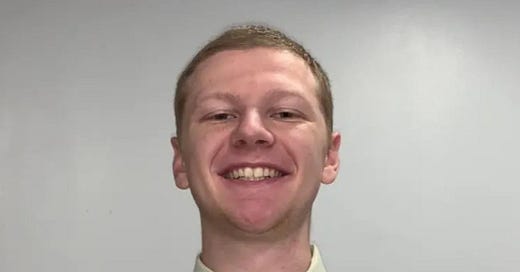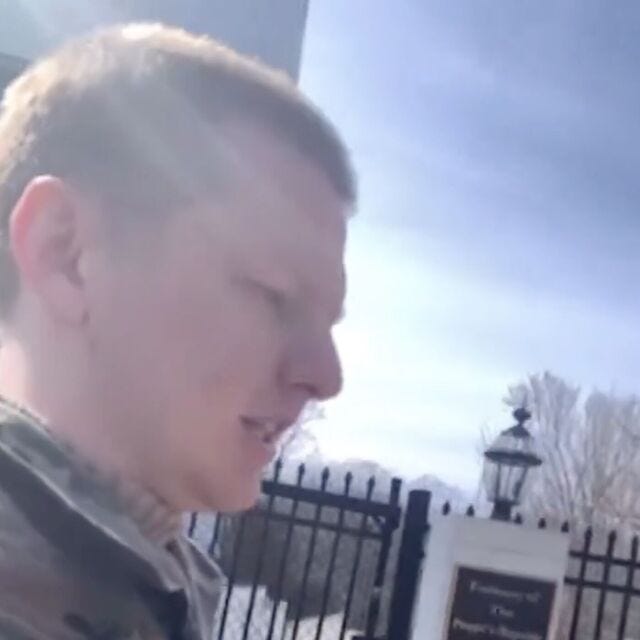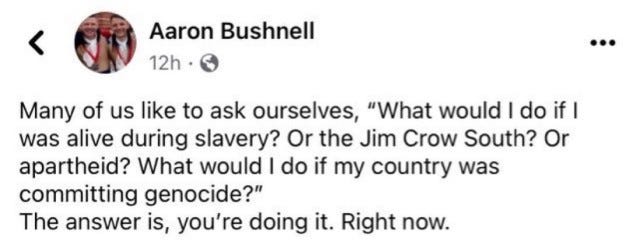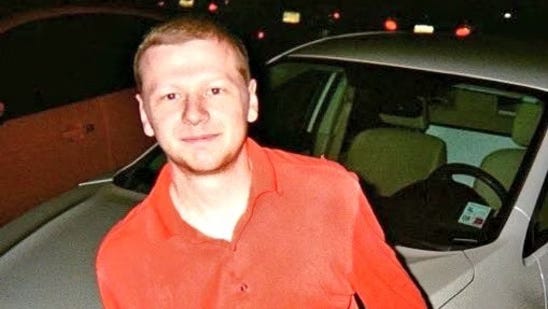The Fire This Time: Aaron Bushnell and the Rage that Burns Within All of US
"Free Palestine," were his final words
This article is dedicated to Aaron Bushnell, his family, and everybody struggling with the guilt and despair that helped stage Bushnell’s final act of protest.
I’m still shaken.
24 hours after watching the video, the young man’s sullen face as he paced stay with me. The words he uttered while he stepped toward the site of his final protest echo loudly in my head.
“I am an active duty member of the United Sates Air Force, and I will no longer be complicit in this genocide.”
He spoke, looking away and toward the camera, as he took steps closer and closer.
The pain on his face signaled more than fear. Aaron, after all, was only 25. The reality of what he was about to do was sinking in, deeper and deeper, while the weight of genocide compounded by the creep of suicide fell hard on his shoulders.
You can see it on his face. You could, despite the vain certitude that shelled it, hear it seep from his voice.
“I am about to engage in an extreme act of protest. But compared to what people have been experiencing in Palestine at the hands of their colonizers, it is not extreme it all.”
He marched forward, like a soldier. That was, after all, who he was. Who he signed up to be.
Forward, on the margins of the Israeli Embassy on International Drive in Northwest Washington, DC - at the intersection of the two principal culprits of this genocide.
Israel and America. The flags of the two nations waved behind him as he placed his military cap on his head.
Bushnell was not merely an American. But an American soldier. He wore that badge of shame on his chest. The stain of guilt from “complicity in genocide” inflected his voice and infected his camouflaged uniform.
Unlike most Americans, Bushnell understood his nation’s central role in Gaza’s rolling demise. The reality of 40,000 slain Palestinians burned him with guilt, and buoyed him to undo his military service in radical fashion.
There would be no honorable nor dishonorable discharge for Bushnell. He would take the matter into his own two hands. One carrying a camera, and the other a canister of gas.
The episodes of pain and uncertainty, fear and commitment that reeled forward as Bushnell stepped toward his final stage were just as painful to watch as his last act.
For me, they were even more painful.
I’m still shaken. I can still hear those words and see his face.
The video, from beginning to end, is something I will never unsee.
A young man struggling with guilt and grief, desperation and rage, driven to do the unthinkable until it was unthinkable no more.
Only 25 years old. The planned event felt like a bleak, existential play for a new genocidal chapter in human history. The nihilism spawned by the moment birthed a radical form of protest for Bushnell, much like the extreme powerlessness that moved Mohammed Bouazizi to do the same more than a decade ago in Tunisia.
To quote Sartre, there was no exit for Bushnell but one. And he was committed to take it.
Before he doused himself with gas and let his body aflame, a voice inside my own head spoke to me.
It uttered, “I wish I could have reached Aaron. He looks like one of your students, who could have engaged in protest in ways that did not involve harming himself. That did not require him to take his own life.” Maybe he followed me on social media, I reflected, maybe I could have persuaded him to not do what he did. What the whole word would see.
But, perhaps, that was his intent. His final act of protest would also be his final day in this world, on this earth.
I am sorry that the world, that Gaza, that genocide, that your nation and my nation drove this young man to kill himself in one of the most horrific ways that somebody can kill themselves.
But it was not suicide in its traditional form. An act commit in the shadows of silence, darkness, and isolation, conducted in service of ones self.
Bushnell’s act was the opposite, intended for the world to see. His suicide was intimately wed to genocide, performed before the world’s collective eyes for the sake of others, for the sake of Palestinians in Gaza, desperately moving to shake everybody toward action - toward action that could not match the courage of his radical act.
Bushnell then lit his body ablaze, and the flames spread across his arms and legs, torso and head, eating the skin from the face we just saw minutes ago. A face that will forever be part of this moment in world history, salient to this genocide while never stepping foot in Gaza.
The flames, slowly, ravaged his young body and burned the very life from inside of it.
He would never be the same.
We will never be the same.
We were undone, forever. From what we saw on February 25th in front of the Israeli Embassy ; and from we and he saw from October 8th, 2023 through this very day. Until his final day.
The lines between sanity and insanity blur dangerously for all of us. The lines between reality and absurdity have never been so tenuous. Both dissolved and dissolving by the constant reel of death that invades our timelines and infects our brains, which are designed to absorb the uncut evil of unrestrained genocide.
Bushnell was no cautionary tale, and his final act was not deviant or aberrant in substance. He represented something within all of us gripped by the weight of this genocide, confined by the banality of its charge. He represented the struggle with a scale of visual slaughter that has changed us forever, and a severity of a truth that no degree of Palestinian death will stop the marching orders of evil.
I will remember Bushnell as an everyman not an exception. A real human being instead of an inhuman spectacle, who shouted the very two words that we all utter on our chosen stages of protest.
“Free Palestine!”
Bushnell’s stage was different, and that familiar phrase his final words. The rage and pain that burns within all of us burned outside of him, eating him alive until he was no more.
Until he was no longer a man, but a symbol.
A symbol that will stand vividly in our minds and loudly in our hearts.
This article is dedicated to Aaron Bushnell, his family, and soldiers struggling with the guilt and despair that helped stage Bushnell’s final act.
Khaled A. Beydoun is a law professor and author. He publishes his daily insights on his socials at @khaledbeydoun.









After this Tragedy, the Nascent Recruitment Crisis in the Armed Forces will rapidly escalate. The signs of this are already beginning to show: A full on purge of the ideological Left is taking place in the various branches. Self-Immolation is something that takes hold in a society that is at the end of its Cultural & Moral development. There is not much left for the Empire of Lies, & it may soon find out that Unlike DoorDash Drivers who can be called on the fly... servicemen will not Fight for an Entity which has 'merely money' & nothing much else (especially in the values department).
It’s been difficult to say anything as nothing would suffice, but you wrote it all so well… It’s lovely. 💔